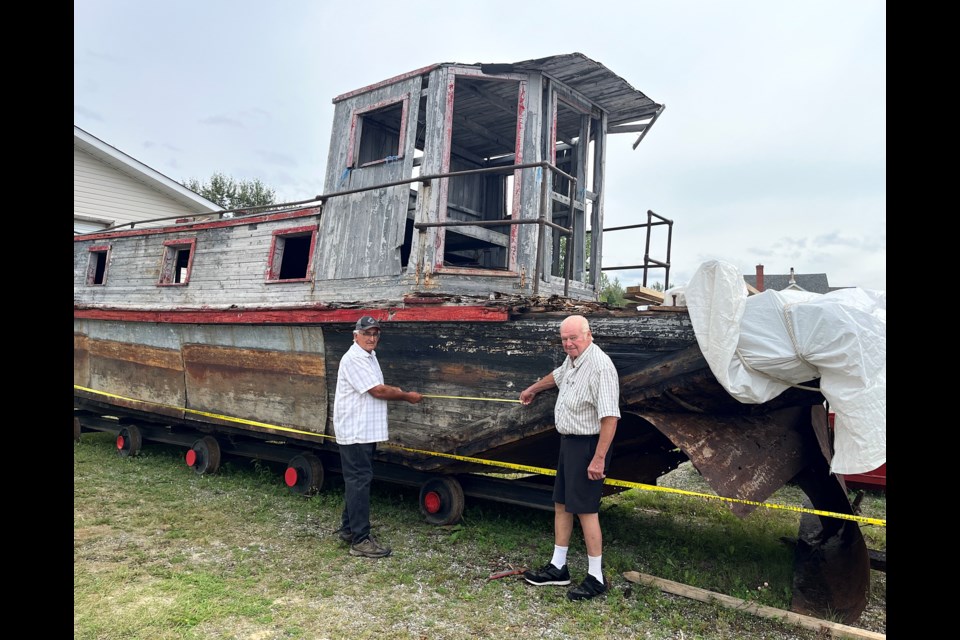Instead of making people run for cover, there is an alligator in Connaught that will attract some folks. Especially if they are history buffs.
The Connaught and District Historical Society is currently in the midst of restoring an alligator boat for its museum.
It is just not any old boat. It was an important part of the lumber industry that thrived in the community for decades.
The T.S. Woollings Mill was the industrial centre of Connaught.
“In 1917, they built the mill, and it started up in 1918,” said Rheal Dupuis, president of the Connaught historical society. “It was the heartbeat of the community.”
The alligator boat was a workhorse of a vessel. It is a 43-foot-long logging boat.
The name came from the manufacturer, The Russell Brothers. With the use of a winch, these boats could pull themselves up on shore for repairs or across stretches of land from one lake to another. Like an alligator, they worked best in the water but could cut across dry land when needed.
These boats were used in the lumber industry from the 1800s to the 1950s. The Woollings mill in Connaught used it on the Night Hawk Lake system and the Frederick House River.
Weighing more than 20 tons, it had a towing capacity of 60,000 logs in a boom, with each log being about 300 board feet long.
Between 1922 and 1956, Woollings transported a trainload of pulpwood daily to customers in Espanola, Thorold, Abitibi and even to the United States. One of their more famous clients was the Saturday Evening Post.
Roy Saari is a third-generation Connaught native. He remembers the mill from his youth. It didn’t produce a finished product like paper, but provided raw wood for other mills.
“It wasn’t a paper mill,” Saari said. “They ran logs through a big drum to get the bark off … then store it in different stacks. When it dried, it was loaded up (and) shipped to different paper mills. It was a wood supplier here.
“It was a big operation. Later on, the mill kept going, but they didn’t want the wood in the rivers any more. So trucked it in.”
While the alligator was a working boat, it was also a source of entertainment occasionally for Saari. He and a buddy, then young boys, would sometimes get to ride the alligator in the mid-1950s.
“It was fun,” he recalled. “A friend of mine, his mother cooked out there (logging camp). If my mother and my father was working, I went. Our recreation was riding on that alligator. My friend, Trevor, and I would sit up on that bench at the back. We could sit up there with the windows open.
“On really nice days, the captain would let us sit on the flat roof on the back. We had some cushions there and a bar to hang onto in case the boat bounced.”
Workers would rotate in and out to the island camp.
“When the alligator was working, they lived on a place called the Scow, on an island on Night Hawk,” Saari said. “They would get the odd weekend off and rotate in.”
There were growing environmental concerns with running logs on the waterways, plus the wood supply eventually pushed away from the water system.
“It was parked in 1957 I believe,” Dupuis said. “The mill burnt down in ’63.”
The museum has a bell that was rung on the boat. Saari’s face lit up with a smile as he rang the bell inside the building like he used to do as a youth — with permission from the alligator’s captain.
Displays in the museum detail the history of the boat and the lumber industry inside.
“We started before COVID, then put everything aside,” Dupuis said. “We were able to get it over here. Built a shelter for it. Did some fundraising and now we’re working on it.
“Once it’s restored, we’ll have a little walk-around tour for people. They can look inside the boat.”
With restoration underway, the museum still accepts donations for the preservation of Connaught history. There are cookbooks sold with a collection of recipes from the old Connaught public school for $10, and a $25 contribution will score donors a Connaught and District Historical Society t-shirt.
The Connaught and District Pioneer Museum is open Wednesday through Sunday from 11 a.m. to 5 p.m. until Sept. 2. It's located at 3980 Connaught Rd. (just past the community centre).
Dupuis believes the alligator boat will be the centrepiece of the museum’s collection once complete.
“It’s our heritage,” he said. “People who have lived here for years will remember it.
“Even the younger generation here realize it’s part of our heritage.”
